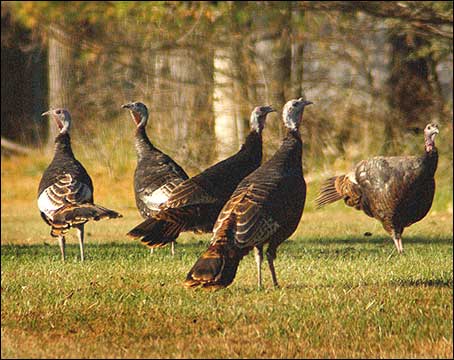Don’t Feed Wild Turkeys in New Hampshire

As my brother-in-law Henry Camirand and I were returning from a pheasant hunting trip, we passed a house and couldn’t believe all the wild turkeys that were gathered in the yard. “There has to be at least 20 wild turkeys there,” Henry commented as we drove past. Yes, we were indeed in a rural area, but the sight was astonishing. “I’ll bet the people living there are feeding them,” I replied. And, if that is the case, our Fish and Game Department wouldn’t be happy.
No, there isn’t any law against feeding the turkeys. However, the New Hampshire Fish and Game Department highly discourages people from purposely feeding wild turkeys because doing so enhances the likelihood of disease, predation and human conflicts. The Department does not provide turkey feed or compensate individuals for the cost of turkey feed. It does however, participate in qualifying cost/share projects intended to enhance turkey habitat. Good habitat management practices that result in the production of winter persistent fruits, seeds and grains, can enhance the value of your land to wildlife and eliminate the need to feed.

While Fish and Game does not advocate wildlife feeding, they recognize that turkey feeding will at times take place with or without their input. They also recognize that poor feeding practices may do more harm than good. Therefore, they offer the following information:
-
Be advised that irresponsible wildlife feeding can result in: the spread of diseases and parasites, increased rates of predation by wild and domestic animals, human habituation by wildlife and resulting animal nuisance problems, and the illegal taking of wildlife.
-
In winter, do not feed turkeys unless there is 15 or more inches of soft powder snow on the ground for a period of 10 or more days. Doing so is wasteful and unnecessary.
-
Do not feed turkeys during spring or fall or during the winter when there is incomplete snow-cover or patches of bare ground.
-
Do not feed turkeys within 100 yards of an occupied dwelling, adjacent to busy roads, in areas of high visibility, in residential areas or in areas where pets, predators or vehicles pose a threat to traveling or feeding turkeys.
-
Do not treat turkeys in such a way as to diminish their natural wariness of humans, keep human contact to a minimum.
-
Do not feed wild turkeys in areas that facilitate contact with game-farm turkeys. Doing so will result in cross breeding and diminished wildness in our native birds.
-
Do not forget that wild turkeys are a public resource. Turkeys range widely (over several square miles) and are hunted throughout the state, where biologically sustainable.
-
Feed turkeys cracked or whole kernel corn, sunflower seeds, oats, wheat, or non-medicated commercial poultry or turkey rations.
-
Feed turkeys daily by broadcasting food at a rate of two large handfuls (or ½ cup) per turkey per day. To ensure a good distribution of food among flock members, spread it out so that all birds have an opportunity to feed.
-
Feed turkeys until the flock ceases daily visitation or until severe conditions moderate.
-
Feed turkeys where you have observed turkeys feeding naturally in the past. Preferably this is in close proximity to winter roost sites (often pine stands). Doing so minimizes movement and energy expenditures between roost sites and feed sites.
The return of wild turkeys to New Hampshire is a true wildlife restoration story, funded through the Federal Aid in Wildlife Restoration program. Turkeys had completely disappeared from the state for more than a century until New Hampshire Fish and Game released 25 birds in 1975. The Department has managed the population through science-based research since that time, guided in recent years by 10-year Big Game Management plans. And, a lot of credit for the successful return of the wild turkey belongs to Wildlife Biologist Ted Walski, who has been the Department’s Turkey Project leader for many years. Our wild turkeys are a sight to behold indeed.

Bob Harris can be
reached via e-mail at:
outwriter2@aol.com
Past
Columns by Bob Harris
>>>
About
Bob Harris
>>>
DISCLAIMER: The opinions
expressed by Mr. Harris are not necessarily those of the
Goffstown Residents Association or its members
Copyright©2009 Goffstown Residents Association. All Rights Reserved. |





